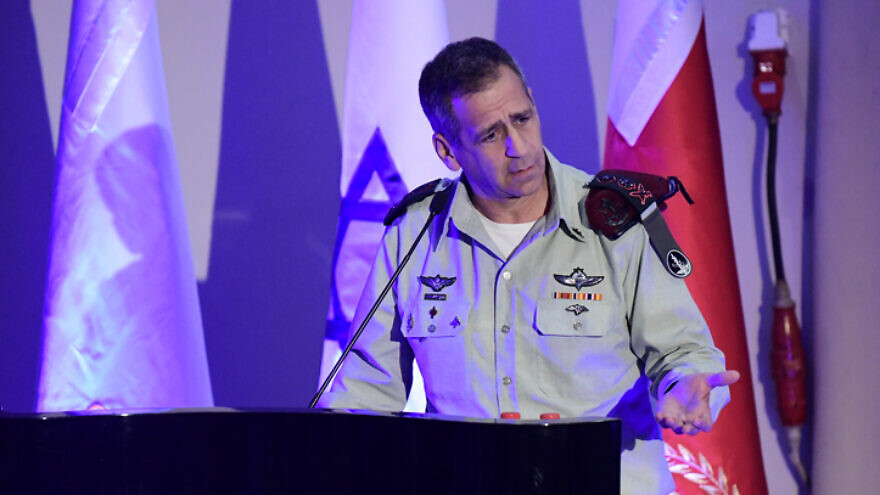by JNS
"We are sparing no effort to stay one step ahead of the enemy," says IDF Chief of Staff Lt. Gen. Aviv Kochavi, but there is a need to bolster national resilience in the face of the growing missile threat.
 |
| IDF Chief of Staff Lt. Gen. Aviv Kochavi at a ceremony for outstanding soldiers in the IDF Technology Unit, at the Glilot army base, on Dec. 02, 2019. Photo by Tomer Neuberg/Flash90. |
“Winning wars isn’t enough. We have to make sure that we achieve a decisive result that ensures deterrence,” Israel Defense Forces Chief of Staff Lt. Gen. Aviv Kochavi said on Wednesday.
Speaking at a security conference at the Interdisciplinary Center Herzliya, Kochavi explained that “one of the IDF’s roles is to ensure periods without wars. Winning wars isn’t enough—we have to manage security in a way that doesn’t test the public every two-three years.”
However, if forced into such a test, he said, the IDF will not hesitate.
“War is always the last resort but sometimes, war is a solution. Therefore, when we act, we will always be in a just moral position of acting with the purpose of defense rather than offense. Once we have been forced to reach this situation, we will not hesitate to employ the full force of the IDF, even in the urban sphere where the enemy has chosen to act,” he said.
He further noted that regional changes have led to a rise in the threats Israel faces.
“We are sparing no effort to stay one step ahead of the enemy. Every arena is active and we are dealing with a growing number of arenas and a growing number of enemies,” he said.
The enemy is also becoming increasingly sophisticated, he warned.
“Their warheads and missile range are growing and in the next war, we will sustain more fire. We have to acknowledge that and prepare for it, mentally as well.”
Commenting on Iran’s nuclear ambitions, the chief of staff said that “Iran has doubled the amount of enriched material [uranium] it is allowed to have [under the terms of the 2015 nuclear deal] and its scientists are working on the ability to assemble a warhead. Iran has become more aggressive—first and foremost against the [Persian] Gulf states. There’s no deterrence, no response and no retaliation [on the part of the Gulf states]. Iran has changed its policy toward us, but we are responding and will continue to respond.”
Kochavi said that the possibility of a”limited conflict—or more than that—with Iran exists. It would have been better if we were not the only ones, but this is the reality for the time being. We intend to continue with our efforts to undermine Iran’s efforts to gain a greater foothold in the northern sector and in Iraq.”
Still, the chief of staff said he believes none of Israel’s enemies want to provoke a war at this time.
This, he said, “has to do with our abilities and willingness to exercise power from time to time. Some of our recent operations have been able to bolster deterrence, but that’s never foolproof. Deterrence needs maintenance.”
With regard to Israel’s southern front, Kochavi said Hamas’s desire to improve the lot of those it rules over in the Gaza Strip represents an opportunity.
“I recognize an opportunity in Gaza—Hamas wants to improve Gazans’ welfare and it has a strong desire to avoid an escalation,” he said.
The chief of staff added that alongside the IDF’s preparations, there is a need to bolster national resilience.
“Destroying enemy assets on the ground is the key to success,” he said, adding that should a conflict erupt with the terrorist groups in Gaza or with Hezbollah in Lebanon, “We’ll have to respond forcibly. It won’t be a war fought for just a day or two. I can’t promise short wars. National resilience will be called upon and that means that our enemies will see that the public is strong and understands that they have to stay steadfast through it.”
Kochavi also noted that Israel’s efforts to maintain its security have the support of the United States and Russia.
“Military relations with Russia are excellent. Military ties with the United States are outstanding. We are concentrating our efforts on the northern sector, placing an emphasis on precision missiles and [Iran’s elite] Quds Force,” he concluded.
This article first appeared in Israel Hayom.
JNS
Source: https://www.jns.org/limited-conflict-with-iran-is-possible-idf-chief-warns/
Follow Middle East and Terrorism on Twitter
No comments:
Post a Comment